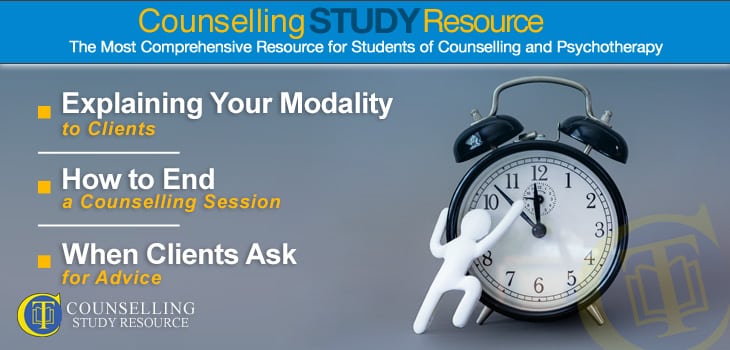102 – How to End a Counselling Session
Explaining Your Modality to Clients – When Clients Ask for Advice
In episode 102 of the Counselling Tutor Podcast, Ken Kelly and Rory Lees-Oakes talk about whether and how to explain your modality to clients. In ‘Practice Matters’, Rory looks at how to end a counselling session. Last, the presenters discuss ways of responding when clients ask for advice.
Explaining Your Modality to Clients (starts at 1.54 mins)
Ken starts by asking: should we even do so? It is important to explain your modality to some extent at the start of therapy, so that clients can understand what’s on offer and so make an informed decision on whether it is the right approach for them.
Some clients may have experienced therapy before, while others are completely new to it: it matters that clients know what they can expect. Ken and Rory describe how they each explain the person-centred approach to clients.
While person-centred counsellors would not go beyond this to explain the underpinning theory to clients, it is not a taught model.
Some other models, however, are active-directive and it is necessary to teach clients the model in order for the client to be able to benefit from the therapy.
Two examples of this type of modality are cognitive behavioural therapy (CBT – where the therapist would explain the nature of negative thoughts, and how these can affect emotions and behaviour) and transactional analysis (TA – where the therapist would explain the parent–adult–child model).
It can be very tempting in person-centred practice to come out with theoretical terms that you see as relevant to explaining a client’s experience (e.g. ‘condition of worth’ or ‘introjected value’) but doing so would take the client away from their feelings and into their head.
Whatever your modality, it’s important to remember that – as clinical psychologist John Norcross discovered through his extensive research – it is the therapeutic relationship rather than the model that is the most important influence on the effectiveness of therapy.
In transactional analysis, the idea of the ‘relational turn’ was developed by Helena Hargaden and Charlotte Sills and is described in Transactional Analysis: A Relational Perspective (Routledge, 2002).
How to End a Counselling Session (starts at 12.09 mins)
Rory explains how to end a counselling session in a timely and professional way – a topic that is sometimes not covered in much depth in counselling training. He looks at:
- what to think about in ending a counselling session
- how to time the ending
- how to pace the counselling session
- how to deal with confounding variables (i.e. things that the client might say at the end of the session that could delay its ending)
A handout on how to end a counselling session is available here – or you can access it via the Handouts Vault and Counselling Study Resource (CSR). Rory has also delivered a lecture on the use of structure in counselling skills in the CSR.
When Clients Ask for Advice (starts at 15.51 mins)
Advice-giving is not part of counselling: advice is our own experience recycled, and comes wrapped up with rescuing and sympathy (as opposed to empathy).
With advice comes judgement: it is based on your frame of reference and so on your truth. The client’s truth may well be very different. Advice-giving fails to recognise that each person’s journey is different and their own.
When a client finds their own solution, it is a far more appropriate and meaningful one for them, and they are far more likely to act upon it.
But what should we do if a client specifically asks us: ‘If you were in my situation, what would you do?’ Rory shares two possible ways of responding:
- You could ask the client to imagine that they have a friend in the same situation as them, and ask them: ‘What would you suggest to your friend?’
- You could follow the example of one of Rory’s tutors when he was training as a counsellor and respond: ‘Anything I’d want to.’
Free Handout Download
Art of Closing a Counselling Session
